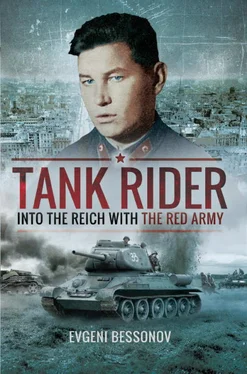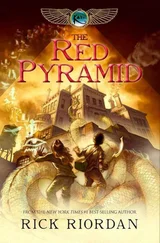On the same day, late in the afternoon, Katyushas fired a salvo. It was good that we were in our foxholes, because when the Katyusha missiles started to explode to the right of the company and then closer to us, we were all able hide in them. Several missiles exploded on the company’s positions, but no one was hurt. When this nightmare was over and I peeped out from my foxhole, and saw a large piece of a missile that had not exploded lying just outside. The entire salvo had hit an empty spot and us, but they should have been firing on the neighbouring hill, where Germans were digging in – the Germans that I had fled from.
How can one explain this mistake in firing the salvo? Only by the fact that someone, apparently Belan, gave the wrong co-ordinates, confused two hills, or maybe just did not know how to read the map. The salvo could easily have knocked out the whole company, as at Skalat, when the 2nd and 3rd battalions suffered significant losses from Katyusha fire. The battalion HQ requested the results of the Katyusha salvo over the ’phone. I informed them that the salvo had hit an empty spot and the company, but no losses were inflicted and they should have shifted fire to the left. However, the Katyushas did not fire any more. Some time after the fire mission my soldiers reported to me that engineers wanted to blow up the only bridge across the river. The engineers confirmed that they had had such an order, while the battalion informed me over the ’phone that I was not to prevent them from blowing up the bridge. They also informed me that all communication with me was discontinued and that the ’phone operators were to leave me together with their ’phone and cable.
I was outraged, but they told me: ‘It is necessary’. I thought ‘Well, to hell with you all’, but was more precise in my description of the commanders, using some obscene words. In general, our company officers only used such obscenities in extreme cases, if ever. We did not curse in vain and did not use such words to get the soldiers up to attack. I walked up to the engineers and asked their senior to blow up only the part that touched the western bank, approximately half the bridge, leaving the eastern part intact just in case. The engineers took heed of my request and did everything as I asked them.
I was left there as a condemned man, with a company of 25 or 30 soldiers, of whom half had not seen battle and were untrained – they had not even been sworn in. We had neither heavy nor light machine-guns. The bridge did not have a strategic significance, as its capacity was low. Dobropolie village also did not have any military significance, as it was located in a depression between the high banks of Strypa river. Even now I do not understand what the battalion leadership had on their mind when they left the company on the western bank of the river, holding literally a patch of soil. The battalion and the Brigade had no reinforcing units left after the heavy fighting before we reached Strypa, but we all knew that the enemy brought up fresh reserves, which were superior to our Brigade.
The engineers said that they hoped we would survive as they withdrew, expressed their sympathy and said that they were not guilty. They looked as if they were saying their last good-bye to us – apparently, they thought that we were already dead. I had to follow the order, what else could I do – an order is always an order.
I do not want to praise myself, but by that time I was already an old hand and was not planning to give up my life or the lives of my soldiers yet; I did not hope for luck either. I thought that it was impossible for me to hold the bridgehead anyway, and ordered my soldiers to join our bank with the remains of the bridge on the other bank using wooden beams, thus creating some kind of bridge across the river. Besides this, I transferred soldiers from the southern part of the village to the northern side, where the earth road to the bridge was located. I thought that the Germans would not attack across the ploughed field, where we initially had our defences, but would advance on some sort of a solid road. In each foxhole on both sides of the road I placed two soldiers, to make each other braver through mutual support.
A dark night fell. I was at the right side of the road with several soldiers. Everything was quiet so far. I checked the positions of the soldiers. The men couldn’t sleep, but some were sleepy and I warned them to be at full alert, as we could overlook the moment of German assault. Personally I, fearing a German assault, was also awake. The Fritzes rarely attacked at night, but anything could happen, the possibility of a night assault could not be excluded, and I did not have much faith in my new soldiers. It all happened just as I thought it would. Just as dawn broke and the sky started to grow lighter, the Germans assaulted the company. It was a surprise attack, but some soldiers opened fire. Some, especially the rookies, left their foxholes and ran to the bridge. Some of them were wounded; we bandaged them and sent them into the rear. The veterans were not hurt, as they fired on the enemy and did not run without a backward glance. We had to retreat.
I gathered all the soldiers at the bridge, and we opened fire from submachine-guns at the Germans, stopping them at the line of our foxholes. It was hard to see either the Fritzes or our own men in the gloom. I wanted to regain the positions, but assistant platoon leader Savkin talked me out of it, pointing at the green soldiers, who, putting it mildly, did not feel well, shivering with fear. They received several boxes on the ears from the more experienced soldiers for their behaviour. Such a ‘teaching method’ was rarely used, but in that case I did not object and did not stop the men. Wooden beams were carefully placed on the bridge, and we safely crossed to the other bank, digging in at the bridge. Day came and I informed the battalion commander that we had had to abandon the western bank of the river. As an answer I received an order: ‘Come back to the other bank the same way that you ran away from there, immediately recapture the positions.’ Why on earth did they need that bridgehead?
I had to fulfil the order, and for the successful completion of it I studied the enemy’s positions, noting his weapon emplacements. I got some understanding of where the enemy was, how many Germans were there and what they were doing. It was quiet and calm, except sometimes the Fritzes fired single shots at us; we did not return fire. Preparing for assault on the lost positions, some soldiers cooked food – one still had to eat. I talked personally to every green soldier, debriefing his behaviour in battle. I told them that fear was natural for everyone, but one should never lose control over fear and let it grow into horror of the enemy. I gathered the squad leaders separately and shared the object of the assault among them.
We sneaked across the bridge and suddenly stormed their positions. The Fritzes were about to have their lunch and did not notice our rush, as we approached quietly without any shouting. I did not really think that the Germans would be so scared and shocked by our assault that they would flee from their foxholes without a single shot, leaving weapons and unfinished lunch behind. Sergeant Poddubny scared the German machine-gunner so much by popping up some 10 to 15 metres in front of them that the guy ran away, leaving a battleready MG34 and his lunch in the canteen. His first course was in the canteen and the second course – pasta with a piece of meat – was in the canteen lid. Many of my soldiers did not even fire a shot, so rapidly did the Germans make their escape. Then the 2nd company commander, Shtokolov, with a dozen former partisans arrived on the scene. All those men were quite drunk and all of them, except for recently appointed 2nd company commander Senior Lieutenant Grigori Andreevich Shtokolov and Lieutenant Alexei Belyakov, were dressed in civilian clothes. Shouting ‘Hurrah!’ they threw themselves behind the fleeing Germans, but were stopped by fire from a nearby forest. If they had appeared a bit earlier, they would have spoiled our quiet surprise assault. When they reached our foxholes, Shtokolov asked for the MG34 from Poddubny, the guy who captured it. I permitted him to give it away – we did not need it anyway, it was quite hard to operate – in fact, I did not know how to use it myself.
Читать дальше












